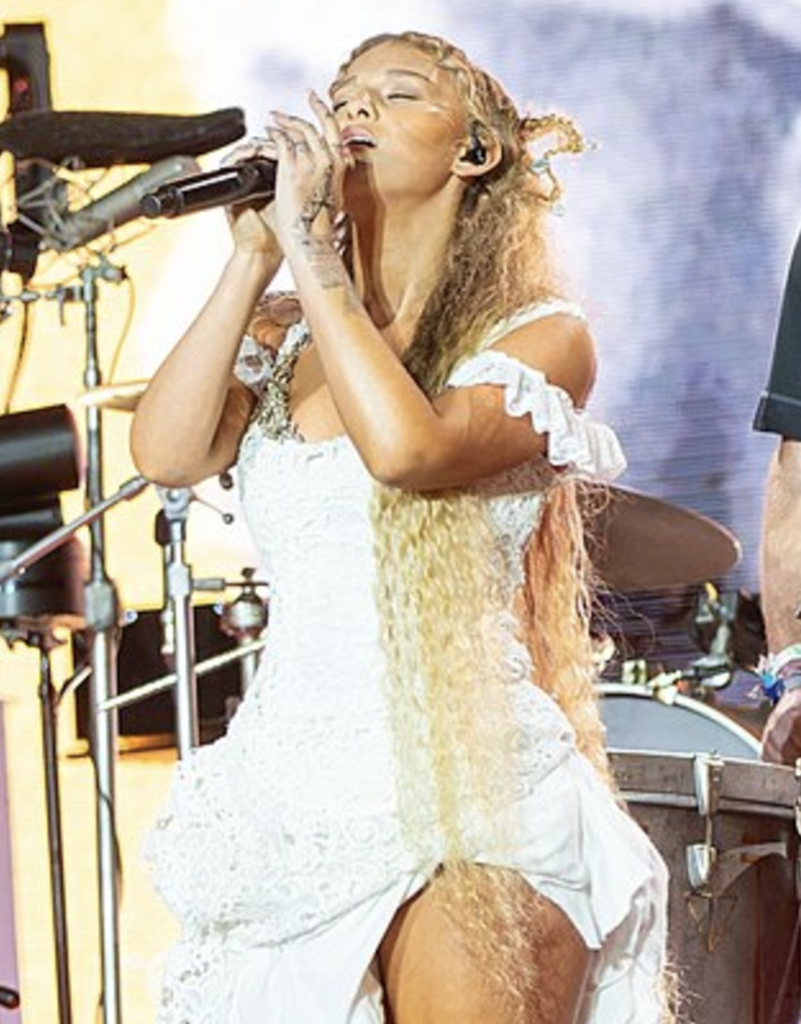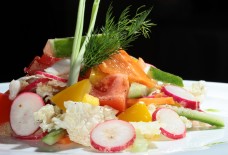Pathbreakers of Arab America--Elyanna

By: John Mason / Arab America Contributing Writer
This is the sixty-sixth of Arab America’s series on American pathbreakers of Arab descent. The series includes personalities from entertainment, business, sports, science, arts, academia, journalism, and politics, among other areas. Our sixty-sixth pathbreaker is Elyanna, born to a Palestinian Christian mother and Chilean father in Nazareth on January 22, 2002. She is a singer and songwriter of alternative pop, Arab pop, Arab traditional music, and urban. Elyanna loves singing in Arabic—the style of music that keeps her grounded in her identity. She is unapologetically Palestinian, expressing her commitment through her art.
Elyanna—her youthful exuberance, love of music, and expansive talent have propelled her to become an ambassador of Arab song
Elian Marjieh, known professionally as Elyanna, was born on January 22, 2002, in Nazareth to a mother of a Palestinian background and a father with Chilean roots. Her mother is a Palestinian poet, and her maternal grandfather is a Palestinian poet and singer who used to perform ‘zajal,’ oral folk poetry in colloquial Arabic, at Palestinian weddings. Elyanna has successfully combined “Arab music with Latin rhythms to create an experimental Arab-pop sound that has captured a global audience,” according to Wikipedia’s series on Arab Americans. She began singing informally at age seven, her talent nurtured by her parents and siblings.
Early on, Elyanna was introduced to record producers, including 15-time Grammy-winner Nasri Atweh. Under Atweh’s tutelage, Elyanna has released two EPs: Elyanna (2020) and Elyanna II (2022). Shortly after, according to a Guardian interview, she announced her first world tour in support of her debut album ‘Woledto’ (‘I Am Born’), featuring certified bangers ‘Ganeni’ (‘Make Me Crazy’) and ‘Al Sham,’ an ode to the Algerian singer Cheikha Rimitti and Levantine heritage. Elyanna has become “used to bringing Arabic, and overt celebrations of Palestine, to places that generally don’t know the language.
Elyanna became the first Arabic-language performer at the Coachella music festival in California in 2023; in May, she made her television debut on the Late Show with Stephen Colbert as the show’s first Arabic-language performer, singing ‘Callin’ U’ (‘Tamally Maak’), a bilingual interpretation of several international classics, and ‘Mama Eh’ (‘Mama What’).” She pointedly donned the keffiyeh, the traditional Palestinian cloth that we all know has become a symbol of resistance to Israel’s war on Gaza.
In 2017, at age 15, Elyanna and her family moved from Palestine to San Diego, California. They eventually settled in Los Angeles to further pursue her musical career. There, Nasri Atweh introduced her to Wassim “Sal” Slaiby, owner of a recording studio. Elyanna was then mentored by Nasri and fellow singer and producer, Massari. She is inspired by jazz and blues though importantly by such Middle East favorites as Dalida, Fairuz, Sabah Fakhri, and Abd El Halim Hafez. Elyanna has performed in such Arab countries as Jordan, Tunisia, and Egypt, and in 2023 she was a big hit at the El Gouna Film Festival on the Red Sea in Egypt, where she sang a tribute to her homeland of Palestine with her single, ‘Olive Branch.’
On 29 June 2024, Elyanna was invited by British rock band Coldplay to perform the songs ‘We Pray’ and ‘Arabesque’ at the Glastonbury Festival, and on July 22, she officially announced the ‘Woledto’ Tour, with concerts in North America and Europe between October and December 2024. Elyanna performed alongside Coldplay on ‘Saturday Night Live’ on October 5, 2024.
Passionate about her Palestinian culture, Elyanna expresses her feelings in a recent interview
Elyanna told the Guardian she wants to bring Arab music to a wider audience. Following an afternoon music festival at New York’s Governors Ball this past June, she was described as a “Palestinian-Chilean singer pioneering an experimental Arab-Latin pop sound.” The description of that event is worth quoting: “Swaddled in angelic white lace, honeyed hair braided with gold coins, the 22-year-old courted a crowd full of Palestinian flags in English (We have gen Z shaking the floor!) but sang almost entirely in Arabic. The effect of her ambitious blend – Arab pop, EDM, American jazz, Latin rhythm, traditional Middle Eastern instruments, the insouciance of Rihanna, and bellydancing reminiscent of Shakira – was mesmerizing.”

During the interview, Elyanna spoke of trying to break into an English-language market, though she was unapologetic about her devotion to her heritage and language. “A lot of people doubted because they don’t understand it,” she told the Guardian. “You gotta teach people. You gotta teach them to love something new, something that they’ve heard. It’s time for our culture to push it in a way where it’s claimed and people talk about it and we just put it up there in front. It’s time.”
Elyanna continued, she feels that Nazareth is still near and dear to her heart. “This is my home, this is my culture,” she said. “There’s so much that I learned from where I come from, which inspires me right now, even when I live in LA.” The dream, starting at age seven, was just to sing – any language, any style, anywhere. “I just really loved music, and I just wanted to be an artist and a performer,” she said. Her older brother Feras, a musician, pushed her to perform in Nazareth. The career was and still is a family project – Feras is her creative director and producer, her mother is her co-writer, and her sister Tali, is her stylist.
Her rise is especially bittersweet, The Guardian averred, since it coincides with the devastating violence of Israel’s war on Gaza and intensifying oppression in the West Bank. In response to the outbreak of the war last fall, Elyanna postponed her US tour. Earlier this year, she helped design, along with her brother, clothing emblazoned with ‘albi falastini’ (‘My heart is Palestinian’); all proceeds went to Gaza via Middle East Children’s Alliance. This spring, she performed at Brown University amid widespread pro-Palestinian campus protests to a crowd dotted with keffiyehs.
Rather than talking about her Palestinian background and feelings, Elyanna prefers to speak through her music – “Through distance, you’ll learn the meaning of togetherness,” she sings in Sad in Pali, reciting a poem by her mother. “Through distance, your heart will learn the meaning of drought / And your heart will learn the taste of return / After the wait.” She does not shy away from championing the Palestinian people. “I’m an artist, and I have a message, and I am very, very proud of my culture, and I’m very passionate about my culture,” she said. “So, it feels like a relief that I feel like I’m spreading my message as an artist, and I use my music to send a message.”
“That’s what artists do,” she added. “We should speak our minds and spread love and spread a message that means something.”
Elyanna’s New Single— ‘Al-Sham’ – a tribute to her Levantine heritage
Elyanna pays homage to Arab singers as she embraces her Levantine heritage in ‘Al Sham.’ Publication ‘Scene Now’ depicts the song as “An ode to Sabah Fakhri and Cheikha Rimitti,” Hailing from occupied Nazareth, Elyanna brings together beautifully “this sonic, lyrical and visual homage to her Levantine roots in a captivating piece.”
In enchanting Arabic Fusha (classical), ‘Scene Now’ continues, “Elyanna’s voice channels the traditional sounds and roots inherent in Levantine heritage music, enhanced by a dynamic interplay of instruments that bursts forth, culminating in a vibrant and rhythmic Dabke (Levantine folk dance) bridge that encapsulates the spirit of her homeland.” ‘Al-Sham’ is a video (see below) directed by her brother. “The recurring motif of a golden heart with a dagger evolves into a powerful symbol of empowerment and healing, contributing to a narrative of cultural pride and identity.”
Only 20 years old when the Los Angeles Times reported a story on Elyanna, she was already beginning to break into the pop music world. The Times article characterized her as something rare: “a young Palestinian artist with the clear backing of the American music industry.” She wants to be a pop star in the mold of Rihanna or Ariana Grande. Her 2022 single ‘Ghareeb Alay,’ (‘Strange to Me’), “a slinky heartbreak ballad, has more than 35 million YouTube views. Its only English is the phrase “I am a superstar.” Perhaps Elyanna has met the Times’ prognosis from 2021: “Elyanna would be a rare Palestinian figure in mainstream American life who isn’t being asked to voice suffering or tragedy.”
Elyanna claims, “I don’t like politics at all, I don’t like those things where it’s toxic and weird. I love to represent my culture in a beautiful way. When people think of it, I want them to think of the beautiful things. Belly dancing, our accents, the ‘tatreez’ (Palestinian embroidery). This is really dope.” While Arab pop music has been largely confined to the region or diaspora communities, Elyanna can perhaps change that. “If you like Adele, there’s no reason not to like Elyanna.”
An earlier Arab America article about Elyanna nicely summarizes her rise to fame: “Elyanna emphasizes the bliss that music provides people. Above all, she continues to be unapologetically Palestinian, expressing her roots through her art.”
Sources:
–“Eylanna” Wikipedia Series on Arab Americans, 2024
–“Palestinian Chilean singer Elyanna: ‘I’m passionate about my culture,’” Interview, The Guardian, 8/3/2024
–“Can Arabic-language pop conquer America? A Tarzana ingénue and her power manager says ‘inshallah’,” Los Angeles Times, 7/25/2022
–“Elyanna’s New Single ‘Al-Sham’ is a Tribute to the Levantine Heritage,” Scene Now, 1/30/2024
–Who Is the Rising Palestinian Star, Elyanna? Arab America, 3/17/2021
John Mason, Ph.D., focuses on Arab culture, society, and history and is the author of LEFT-HANDED IN AN ISLAMIC WORLD: An Anthropologist’s Journey into the Middle East, New Academia Publishing, 2017. He has taught at the University of Libya, Benghazi, Rennselaer Polytechnic Institute in New York, and the American University in Cairo; John served with the United Nations in Tripoli, Libya, and consulted extensively on socioeconomic and political development for USAID and the World Bank in 65 countries.
The views and opinions expressed in this article are those of the author and do not necessarily reflect the position of Arab America. The reproduction of this article is permissible with proper credit to Arab America and the author.
Check out our Blog here!









